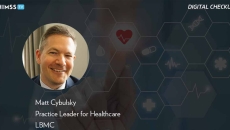Workflow
SPONSORED
According to a Forrester report, RingCentral’s unified communications as a service (UCaaS) and contact center as a service (CCaaS) solutions result in improved customer experiences and cost savings for businesses. In addition, the study found that businesses using integrated UCaaS and CCaaS platforms benefited more compared to those that used separate unified communications and contact center platforms.
What are the trends in digital health implementation across health systems, and what needs to be considered when applying AI for value-based care? Matt Cybulsky, LBMC practice leader for healthcare AI, value-based care and product innovation, discusses.
Data interoperability supports population health and enhanced care delivery for healthcare organizations (HCOs). However, interoperability can also foster data exchange in use cases outside the health system’s facilities.
A prehospital health information exchange in Michigan that provides bidirectional interoperability will bridge ambulatory data gaps and enhance care coordination en route to the hospital and during post-discharge care transitions.
Adding long-range healthcare drones into prescription delivery and lab services, along with supporting health-at-home programs, can reduce care costs and delays, and improve patient experiences, says Keenan Wyrobek, cofounder of Zipline.
Prolonged understaffing in clinical laboratories threatens to compromise patient care, but deployment of automation and artificial intelligence technologies could offer a lifeline to burned out lab workers.
Outside perspectives can be a boon for healthcare clients. So can website-building using low-code tools and AI-enabled process automation to streamline operations. Nicolas Ostrowski discusses the offerings of his company, Future Processing.
Nursing and IT
Integrating analytics and care coordination recommendations into EHR workflows has helped reduce lengths of stay, says the health system's COO – lowering costs, boosting patient access and reducing burdens for nurses and other clinicians.
An exclusive look at what's billed as a first-of-its-kind, EHR-agnostic automated clinical notetaking tool. It uses artificial intelligence to help reduce behavioral healthcare providers' administrative burdens.










